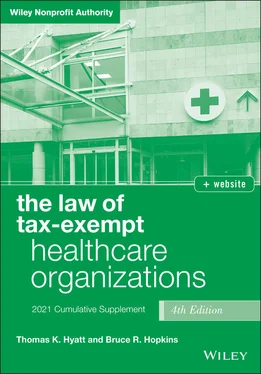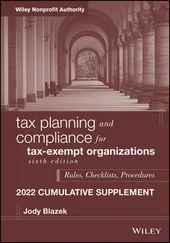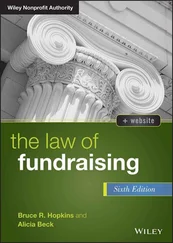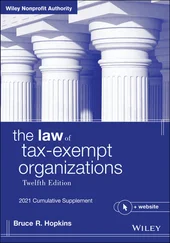Bruce R. Hopkins - The Law of Tax-Exempt Healthcare Organizations
Здесь есть возможность читать онлайн «Bruce R. Hopkins - The Law of Tax-Exempt Healthcare Organizations» — ознакомительный отрывок электронной книги совершенно бесплатно, а после прочтения отрывка купить полную версию. В некоторых случаях можно слушать аудио, скачать через торрент в формате fb2 и присутствует краткое содержание. Жанр: unrecognised, на английском языке. Описание произведения, (предисловие) а так же отзывы посетителей доступны на портале библиотеки ЛибКат.
- Название:The Law of Tax-Exempt Healthcare Organizations
- Автор:
- Жанр:
- Год:неизвестен
- ISBN:нет данных
- Рейтинг книги:4 / 5. Голосов: 1
-
Избранное:Добавить в избранное
- Отзывы:
-
Ваша оценка:
- 80
- 1
- 2
- 3
- 4
- 5
The Law of Tax-Exempt Healthcare Organizations: краткое содержание, описание и аннотация
Предлагаем к чтению аннотацию, описание, краткое содержание или предисловие (зависит от того, что написал сам автор книги «The Law of Tax-Exempt Healthcare Organizations»). Если вы не нашли необходимую информацию о книге — напишите в комментариях, мы постараемся отыскать её.
The Law of Tax-Exempt Healthcare Organizations — читать онлайн ознакомительный отрывок
Ниже представлен текст книги, разбитый по страницам. Система сохранения места последней прочитанной страницы, позволяет с удобством читать онлайн бесплатно книгу «The Law of Tax-Exempt Healthcare Organizations», без необходимости каждый раз заново искать на чём Вы остановились. Поставьте закладку, и сможете в любой момент перейти на страницу, на которой закончили чтение.
Интервал:
Закладка:
31 149 IRC § 529A(b)(3).
32 150 IRC § 529A(b)(4).
33 151 IRC § 529A(c)(1)(B)(i); Reg § 1.529A‐3.
34 152 IRC § 529A(d)(1); Reg. § 1.529A‐3.
35 153 IRC § 529A(d)(2).
CHAPTER THREE Criticisms of Tax Exemption
§ 3.3 Commerciality Doctrine(c) Contemporary View *(d) Commerciality Doctrine and Healthcare Organizations
§ 3.3 COMMERCIALITY DOCTRINE
(c) Contemporary View
p. 65. Insert as third complete paragraph:
The IRS summed up its view as to the “factors indicative of commercial operations,” which include “regular and ongoing … sales [to the public], competition with other [organizations], common retail pricing structures, marketing and advertising, and the reliance on sales and fees versus contributions.” 107.1 Earlier, the IRS asserted that the provision of Wi‐Fi, maintenance of a website, and making power outlets available for patrons’ use is additional evidence of commerciality. 107.2
(d) Commerciality Doctrine and Healthcare Organizations
p. 66, second paragraph, fifth line. Delete and.
p. 66, second paragraph, last line. Delete period and insert comma; insert following footnote number:
and that a nonprofit pharmacy was not entitled to tax exemption as a charitable entity because it is operating a business, selling pharmaceutical products to the public in a manner indistinguishable from a commercial pharmacy. 109.1
*p. 67. Insert as second complete paragraph:
In another ruling, a nonprofit corporation was organized to provide affordable healthcare through education and voluntary employees’ beneficiary association (VEBA) participation. It simultaneously applied for recognition of exemption from federal income tax both as a charitable organization and as a VEBA. The IRS determined that establishing participation in a VEBA is not an enumerated charitable purpose under the Internal Revenue Code and therefore the organization was not organized exclusively for charitable purposes. Further, the fact that the organization was managing a trust that enables employers to establish separate VEBA sub‐accounts for its employees was evidence that more than an insubstantial part of its activities was not in furtherance of an exempt purpose. Finally, the types of services being provided to its members demonstrated that the organization is operating in a commercial manner. 111.1
The IRS continues to exert the commerciality doctrine and its tenets in denying or revoking exemption as a charitable organization. In one ruling, the IRS determined that the activity of developing, promoting, and supporting free medical software for physicians primarily benefits those physicians and their medical practices and serves private rather than public purposes. As a result, the organization engaged in these activities failed to qualify for exemption as a charitable organization. 111.2
The nonprofit organization was formed to support an open source software project. The software permits a physician to schedule patient appointments, remind patients of their appointments, record the history and physical examination of each patient visit, record and transmit orders for pharmaceutical drugs and diagnostic studies, bill responsible parties for services rendered, record the remittances, and comply with Meaningful Use criteria under a federal government reimbursement program. The software is free and can be used with any operating system. The organization provided support to the software project and links to vendors on its website for certified professional developers who charge a fee for their services.
In the view of the IRS, the activities of the organization benefit the private interests of both the physicians using the software as well as the vendors to whom it referred software users for technical support. The IRS concluded that maintaining a website to promote the development, distribution, and adoption of open source software is not an exempt purpose. The physicians and their medical practices derived a commercial advantage from the software because they would otherwise have to purchase commercial software. By providing the free open source software, the organization reduced or eliminated costs for the physicians and gave them a commercial advantage, which is a substantial nonexempt purpose.
In another ruling, the IRS determined that an organization operated for the purpose of preventing cruelty to and promoting the health and welfare of equine athletes, providing experiential education and training to veterinarians, and conducting scientific research in the field of equine exercise physiology, did not continue to qualify for charitable status. 111.3 In its exemption application, the organization stated that revenues would be derived from fees and donations and that fees would be set well below fair market value in order to cover costs. The organization would also charge reduced diagnostic and clinic fees to horse owners who participated in their scientific studies.
However, upon examination, the IRS determined that the organization's primary activity was to provide veterinary services to the general public for a fee, and that the organization was conducting commercial activities regularly, which privately benefited related for‐profit entities. Treatments to horses were provided on a fee‐for‐service basis, which the IRS held privately benefited their founders. It noted that providing veterinary services to the general public on a cost basis is not substantially related to the prevention of cruelty to animals and does not serve a charitable purpose.
And in another ruling, the IRS determined that an organization was not entitled to charitable exemption because it was substantially involved in commercial activity. 111.4 The organization had asserted that its purposes were supporting international research for cures being developed for rare and infectious diseases, leading research initiatives, identifying best practices for streamlining drug therapy approvals worldwide, providing thought leadership and networking activities for industry leaders, and increasing public awareness of the fight to cure diseases globally.
To accomplish its purposes, the organization provided business and consulting services to the biotech and pharmaceutical industries for the development of new treatments for people who are infected with rare diseases. Its intent was to help bridge the gap between rare disease cures being developed and ultimately approved by providing necessary services to support efficient processing of fast‐track approval applications for the development of such drugs. It would also provide executive search services, executive coaching services, and public awareness and educational programs.
The IRS determined that the organization's primary activities were the conduct of a trade or business for the production of income. Its only activities were providing consulting services to clients for a fee. While fees were generally set at below‐market rates, the IRS concluded that this is insufficient to characterize the activities as charitable. The fact that the organization's clients were fighting against rare diseases was also not sufficient to characterize the organization's activity as charitable. Like a commercial business, it services were generally available to any individual or organization willing to pay its fees.
In another ruling, the IRS determined that an organization that provided healthcare education and research services does not qualify for tax‐exempt status as a charitable organization because it engages in nonexempt operations to a substantial degree. 111.5 The organization hoped to advance the availability and quality of healthcare through research, education, and increased transparency to facilitate leadership development, quality outcomes, and informed investment decisions in the healthcare delivery system. Its stated mission was to promote and conduct research on the causes of rising health spending and to provide stakeholders with better information on what is driving healthcare costs, with a goal of discovering ways to reduce them. The initial research would focus on the healthcare claims process. However, according to the organization's website, it will provide a blockchain platform to share information in a secure environment. It was connected to another website that promoted blockchain technology.
Читать дальшеИнтервал:
Закладка:
Похожие книги на «The Law of Tax-Exempt Healthcare Organizations»
Представляем Вашему вниманию похожие книги на «The Law of Tax-Exempt Healthcare Organizations» списком для выбора. Мы отобрали схожую по названию и смыслу литературу в надежде предоставить читателям больше вариантов отыскать новые, интересные, ещё непрочитанные произведения.
Обсуждение, отзывы о книге «The Law of Tax-Exempt Healthcare Organizations» и просто собственные мнения читателей. Оставьте ваши комментарии, напишите, что Вы думаете о произведении, его смысле или главных героях. Укажите что конкретно понравилось, а что нет, и почему Вы так считаете.












